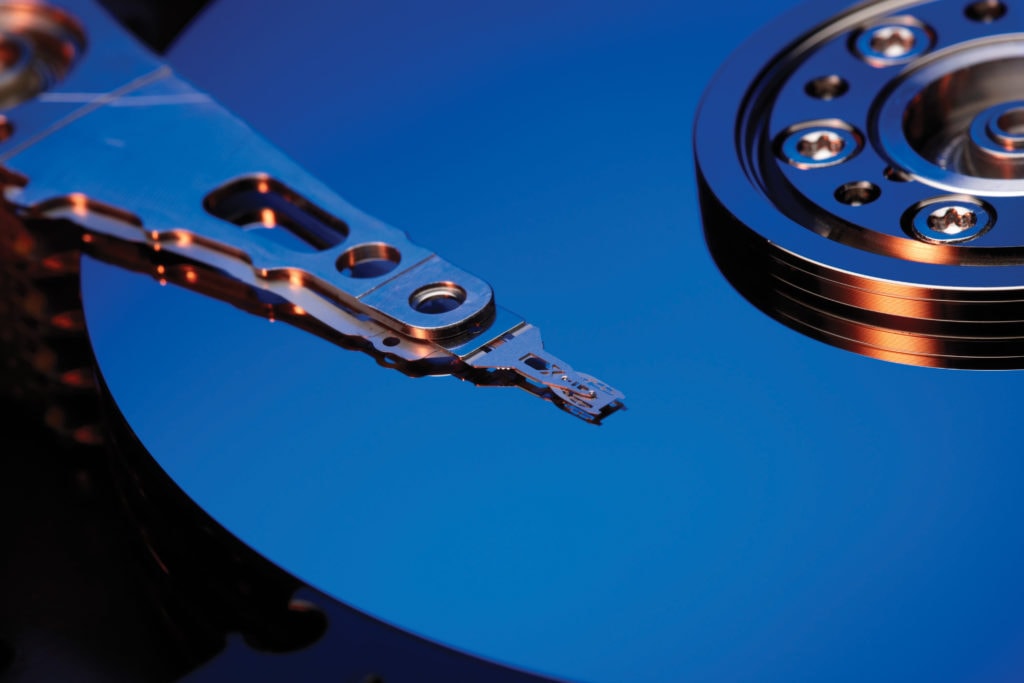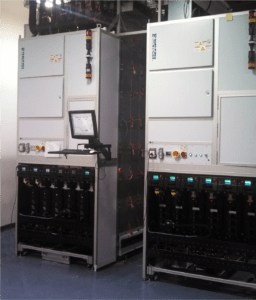Hard Disk Drive
Teradyne’s Automated Hard Disk Drive Production Test Solution
The way we use and share digital data has changed. There is an expansion, all at once, for data intensive applications.
Some or all of the following applications are now a part of our day: digital photos and movies, internet usage, working remotely, IoT, high-end cloud computing and AI. Digital data demand is growing and the demand to store that data is exploding too. Hard Disk Drive (HDD) manufacturers are faced with several key challenges to competitively handle that demand.
A HDD manufacturer’s success requires responsiveness to meet a customer’s schedule and avoid shipment risk. They must be price competitive while maintaining healthy margins. A test environment that ensures drive quality and delivers dependable test data is essential. And, manufacturers want to have a factory floor that is organized, modern and efficient so their customers can depend on them as a reliable supplier.

HDD Production Test Solution
The HDD Near-Line (NL) market is more competitive than ever. HDD test times increase with each new generation of NL drive as industry Exabyte (EB) demand escalates faster than forecasters predicted. EB growth translates into significantly increased Back-End (BE) test times. Increased test times means more test slots to meet shipment requirements which results in test floors rapidly filling up with equipment, people, transport carts, crates and Work-in-Progress (WIP). An inefficient test floor is a hurdle for HDD manufacturers to succeed and their product isn’t even out the factory door.
It is vital that HDD manufacturers find the best solution to optimize BE test and streamline overall operations to capture new customers and respond to changing market conditions.
Back-End Test Process
Hard disk drives require temperature cycling between ambient (low temperature) and high temperature. Temperature cycling is important at different phases of test and is necessary for proper calibration of the drive to make it customer ready.
Some factory test floors utilize segregated test processes. The individual test steps are run on individual test systems. This strategy increases test insertions, operator handling, WIP, process times and creates complex logistics. To compound the problem, most test systems are designed to test groups of drives as one batch which extends test time due to waiting for the worst performing drive in the batch to finish.
In addition, factory power consumption is ballooning in three main areas: thermal control of the drive during test, power draw of the disk drive, and test system base power. Test system base power consumption is the lowest of the three areas because it is 1/3 to 1/6 of the drive power consumption. Drive power consumption is a given for each drive type and cannot be changed. That leaves the thermal control of the drive under test as an area of potential improvement between different types of testers.
Teradyne’s Saturn HD (High Density) Test System
Saturn HD is a high-volume automated HDD production solution. It provides a competitive advantage in overall factory productivity. Productivity can be measured as the number of disk drives tested per square meter (m2) of floor space.
Saturn HD was designed to improve productivity by minimizing floor space needed to support 3.5” NL drive testing. The test system can support the entire HDD Back-End test process, from Self-Servo Writing (SSW) to burn-in to drive configuration, within the footprint of a single system.
Using extremely compact slot spacing with a narrow robot track, zero-meter maintenance aisles and tall (4.1m) test racks, Saturn HD leverages the entire available horizontal and vertical space in the factory. This results in the greatest slot density generating the highest output per square meter of factory floor space. Alternative test systems require 20% to 200% more floor space for the equivalent productivity of a Saturn HD test system.
10% to 70% reduction in test process power consumption per drive
A key requirement for disk drive testers is the ability to change the temperature of the drive. The Saturn HD performs this task with greatly reduced power consumption versus other test systems. This is accomplished by using heating strips that directly contact the drive case. This conductive heating method is a more efficient method, requiring less power, for heat transfer versus using heated air.
For lowering the temperature of a drive, other systems use a secondary water loop to cool the air in the test slot which cools the drive, or they use direct factory air to cool the drives. The Saturn HD creates a chilled air reservoir within the center of the system using a closed loop architecture. When a drive requires cooling the slot fan pulls air from the cold reservoir. The warm air output from the slot is circulated through a heat exchanger back to the reservoir. The result is a highly efficient method to cool drives while saving factory power.
Process Test Time Reduction
Saturn HD is based on an asynchronous architecture making all slots independent from each other. Each slot can start test, ramp thermals, stop test, and run different test programs autonomously. This allows the robot to remove and replace each drive as soon as it is finished testing, reducing overall test time.
The test slots in the Saturn HD can also provide strict vibe control. With improved vibe control, test time is reduced during many of the low-vibe dependent test steps. Each slot of Saturn is engineered to provide a very low vibe environment to execute those test steps.
Through stringent vibe and environmental control per slot, Saturn enables a single insertion for the entire Back-End test process. Individual drive BD SSW high and low temperature burn-in and drive configuration can all be performed within a single insertion of the disk drive. This eliminates the need to remove drives, temporarily store them, then move them to the next test station and reinsert them into a test slot. All of these activities create increased process time, more WIP, added operators, increased shop floor logistics and additional human touch points. Through simplifying the test process, Saturn HD can improve the overall yield of disk drives and creates a highly organized, modern and productive factory test floor.
With the Saturn HD automated production test system, HDD manufacturers can react quickly to customer demands, and capture sudden market opportunities because they are running the most efficient factory.

The Saturn HD is the industry leader in 3.5” Near-Line Hard Disk Drive (HDD) testing. It provides maximum throughput while minimizing factory floor space and power consumption. The system is designed to perform single insertion of SSW, BDSW and Burn-In as well as drive configuration. Using Saturn HD on the production floor will reduce drive build times, enable greater responsiveness to data center demands and lower test costs per HDD unit.